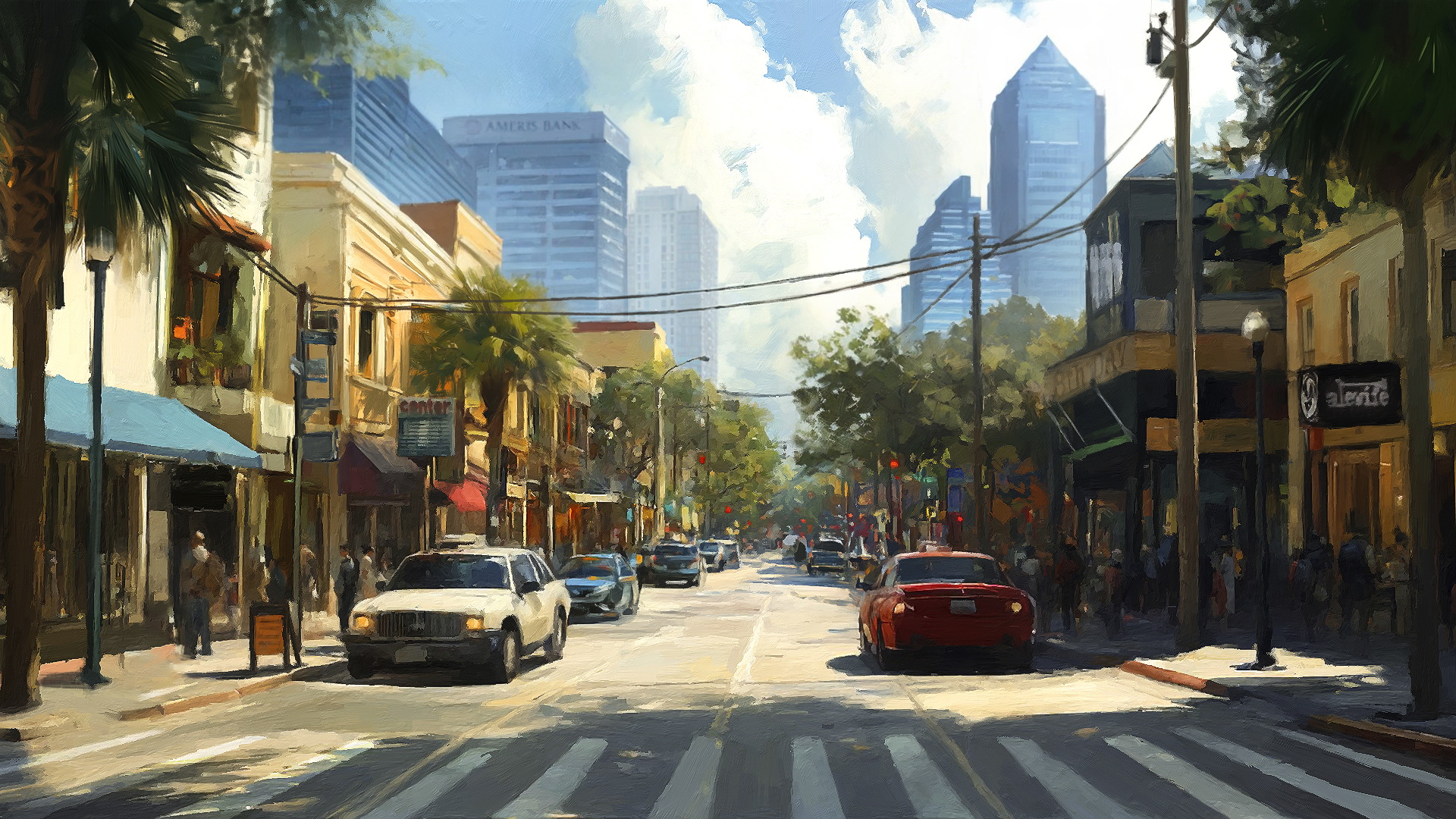
Issue 39 – American Soil
- Jacksonville, Florida, November 20 2039
The first hours spent on American soil were hours of wonder. Few of them had set foot in real badlands before. For them it was a myth – and myths come in many forms. A tragedy perhaps, painted by the masterful strokes of Clayburn Industries propaganda like a brush, depicting the horrors of sickness, starvation and war in vivid colors. Only the tools of professional liars could deliver such mastery.
For others, the myth was a take on legendary heroes protecting the poor from evil that left corporations steadfast and unrelenting, never wavering, even when facing annihilation at the hands of a vastly more powerful foe.
The truth, as it often is, was somewhere in-between. With reality washing away the thick layers of misconception and prejudice, the Seahawks had found Jacksonville to be remarkably ordinary. Gone were the days of high-tech corporate gadgets so popular in the walled Clayburn compounds. The streets were run down despite the visible efforts by the locals to give them a semblance of their earlier luster, yet underneath the grime of years of disrepair, the city was bustling with life.
All kinds of services and items were suddenly available to the Seahawks. Some – such as personal cars – had only been available to corporate officers back in europe, while others had been outright illegal inside corporate-controlled zones. Thousands of smells drifted through the air. The smells of food being prepared mingled with burnt gasoline, as dozens of shops and decades-old vehicles dotted and cruised the streets. The world was reverting back to its old ways, reaching out to technologies that withstand the test of time. The electric madness of the 2020s had been left to rust in great heaps behind each city, the toxic spill from their long-dead batteries contaminating the ground for centuries to come.
Fuel, the lifeblood of this new world, flowed from the south to feed the unending hunger of what was left of American industry. Few in Jacksonville would openly admit it, but it was this flow that allowed the city to survive, locked in an endless symbiosis with “government oppressors.”
What impressed the Seahawks the most was the freedom. No ever-present cameras, no watchful gaze of a faceless drone analyzing every move, reading credit receipts to ensure that cholesterol did not go over a limit determined by the cold mind of an artificial intelligence deep within the bowels of an ex-military bunker thousands of miles away. Instead, a basic, thriving economy that had returned to its roots.
The United States differed from Europe in a vast number of tiny ways that left the Seahawks, who were not born there, with an uncanny feeling. Familiar things had wrong shapes and familiar shapes belonged to the wrong things. This myriad of details assembled together into more of the surreal feeling the men and women of the unit were so familiar with. Africa had taught them this. They had little time to mope as the unit commanders, with Blackwood in charge, kept them busy recruiting.
By the end of the week most of the bars and other places frequented by the local Fighting Falcon mercs were visited by the Seahawk people. Offers of the rest of their meager resources in exchange for services were made in large numbers. For a few, the Seahawks were a welcome distraction from the grinding boredom of a cease-fire with the pro-government forces that patrolled the area to the west. Others joined because of this forever dullness fueled their lust of adventure.
Most locals, however, eyed the Seahawks with suspicion, aware of their corporate past and their deeds in Sinai. By the time the Seahawks departed, their ranks were bolstered by only a dozen, men that stuck together, unwilling to mingle with the old crews.
The hunt for replacement vehicles was another matter. Jacksonville was a trade hub and the war with the government had left the mercenaries with more salvage than they could possibly use in a lifetime. Rows of armored vehicles were parked outside the city, mountains of spare parts and gallons of fuel waited silently for their future owners. It wasn’t first rate stuff – the best pieces had been taken by the Fighting Falcons, but what was left was good enough for the final leg of the Seahawk’s journey. And, fortunately for the Seahawks, the traders were willing to sell after several of the Seahawk crews patrolling north of the town help to fight off an ambush…






